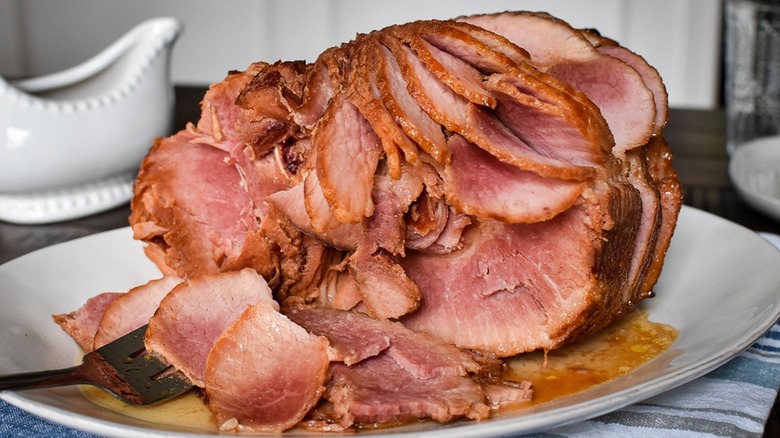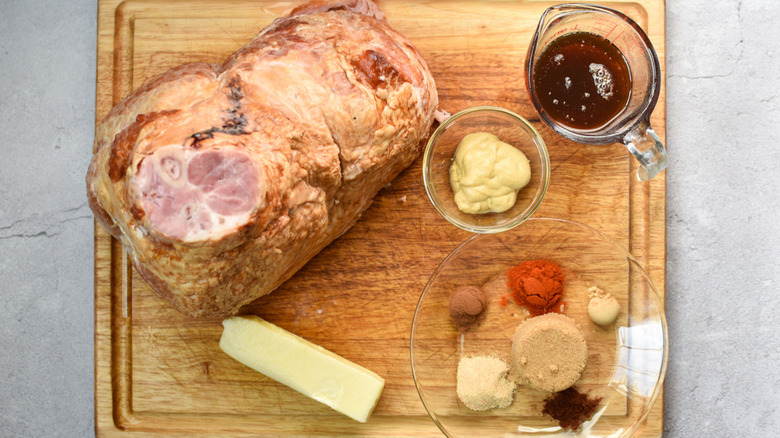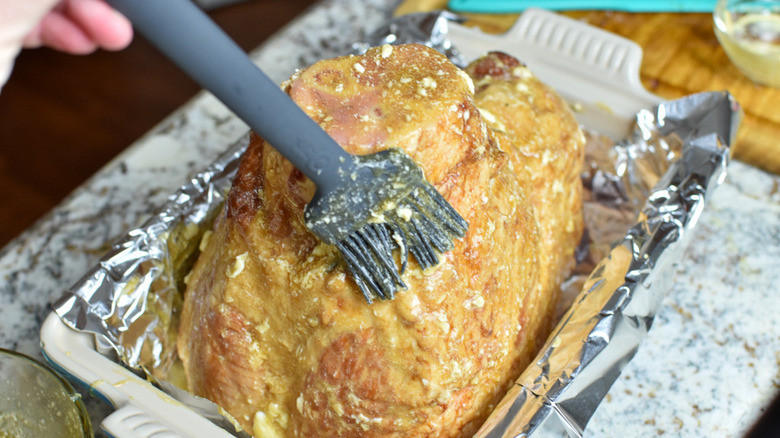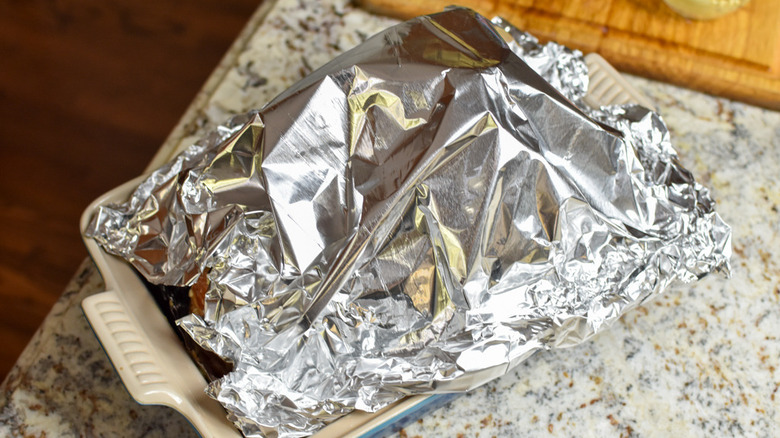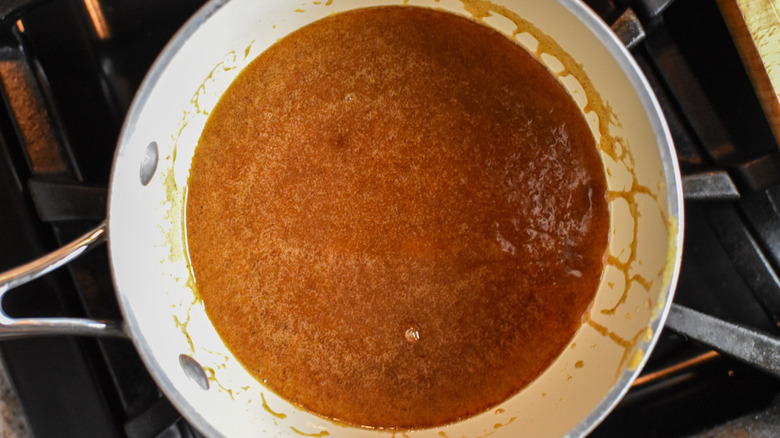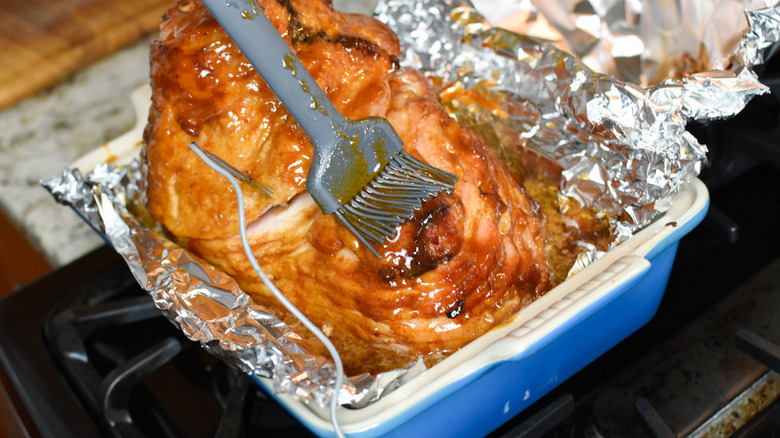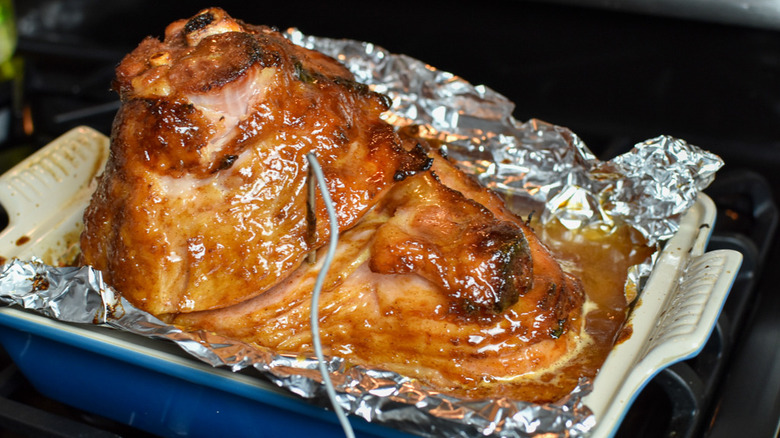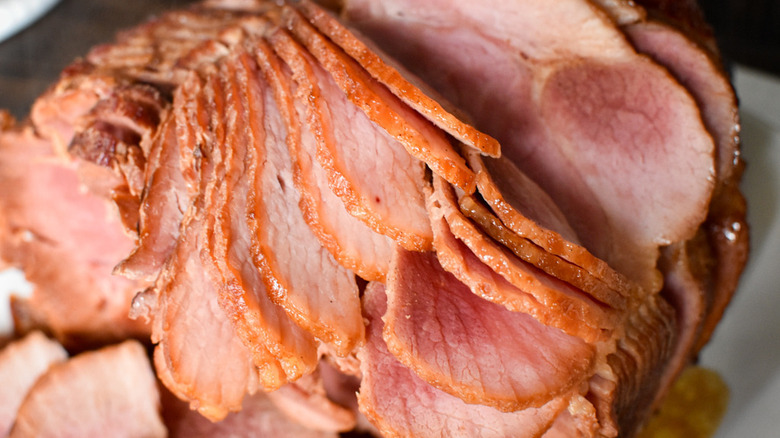Honey Baked Ham Copycat Recipe
Anyone who has ever tasted the sweet and crunchy ham from The Honey Baked Ham Company is probably still dreaming about the perfect combination. Mashed recipe developer Stephanie Rapone agrees, remarking that "It really reminds me of my childhood." For many people, including Rapone, enjoying a large ham is part of holiday festivities, and she adds that in her family, "[we] even had a ham to [go] with the turkey on Thanksgiving." She decided to recreate the iconic glazed spiral ham recipe from the restaurant, noting that she also made an optional sauce, because who doesn't like sauce?
Although this copycat Honey Baked Ham dish looks impressive, it isn't beyond reach for home cooks. Rapone explains, "From a cooking and flavor perspective, it's a very easy recipe to make and serves a lot of people for very little effort." If you're planning to make this ham for the next dinner you host, Rapone adds, "I also like that there isn't much hands-on work with this recipe," which means that you will be able to focus on the side dishes and, most importantly, your guests.
Gather the ingredients for this copycat Honey Baked Ham recipe
For this tasty ham dish, the ingredient list is fairly straightforward — it sticks to some staples and a handful of spices. To begin, you'll need a spiral ham weighing between eight and 10 pounds. If you find a larger or smaller one, just keep in mind that you will end up with more or less glaze accordingly. If you've never come across this type of ham, Rapone explains that it will be labeled as spiral sliced. She adds, "I recommend getting one that has the bone in it, as it stays juicier and more flavorful."
To baste and glaze the ham, Rapone combines honey, butter, and brown sugar. Next, she adds Dijon mustard to balance out the sweetness with a hint of sharp flavor. Then, a mix of spices provides plenty of flavor to make this ham truly stand out. Ground cloves, cinnamon, ginger, paprika, and garlic powder will create the perfect background of warming spices.
Finally, aside from the ingredients for this dish, Rapone notes, "I really strongly recommend anyone make the investment to get a digital probe thermometer." When it comes to cooking large pieces of meat, she explains that "It ensures food is cooked properly from a safety perspective," not to mention that it helps prevent you from over- or under-cooking a dish.
Place the ham in an oven-safe dish and prepare the basting mixture
The bulk of this recipe takes place in the oven, so be sure to have all of your ingredients ready to begin. Remove the butter from the refrigerator so that it has time to soften before you need to use it. Next, preheat the oven to 300 F and line a roasting pan with foil. Rapone points out that since she used an eight-pound ham, it fit into a regular baking dish, whereas a larger piece of meat will require something bigger. For example, she notes, "I've also used a 14-inch cast iron skillet and a five-quart braising pan." Whatever baking dish you choose to use, Rapone warns to "make sure the sides are high because the ham will give off a lot of juices." Place the spiral ham in the pan with the cut side down.
Next, combine the honey, four tablespoons of softened butter, and Dijon mustard in a small bowl. Then, using a spatula or a basting brush, spread the mixture all over the ham, making sure to get some between the spiral slices. Set aside any extra mixture to use in the glaze.
Bake the ham until it reaches 120 F
If you have a remote probe thermometer where the probe goes in the meat and the monitor remains on the counter, Rapone strongly recommends using it. Poke the probe into the thickest part of the ham without hitting the bone, and set the desired temperature to 120 F. Thanks to the technology, the monitor will signal when the internal temperature has been reached. Loosely cover the ham in the dish with some tin foil, then transfer it to the preheated oven.
In case you don't have a remote probe thermometer, Rapone advises roasting the ham for 13 minutes per pound, checking the temperature once the time is up. When the ham reaches an internal temperature of 120 F, leave it in the oven and move on to the next step.
Prepare the glaze for the ham
Now it's time to prepare the glaze for the ham. Set a saucepan on the stovetop and add the rest of the honey, butter, mustard mixture that you previously made. Then, go ahead and add the remaining ingredients: four tablespoons of butter, brown sugar, ground cloves, cinnamon, ground ginger, paprika, and garlic powder. Set the burner to medium heat, and gently stir the ingredients until they have dissolved and the mixture is smooth. Once the glaze is ready, turn the stovetop heat off.
Increase the oven temperature and glaze the ham
Meanwhile, once the ham's internal temperature reaches 130 F, remove it from the oven and discard the tin foil. Raise the oven temperature to 450 F, and spread the glaze over the ham using a brush. Once the oven has come to temperature, transfer the glazed ham back into the oven, uncovered. Roast it for five minutes, then add another coat of glaze before roasting the ham for another five minutes. Keep checking the ham's internal temperature until it reaches a minimum of 140 F and the glaze has set and become golden. At this point, remove the ham from the oven.
Rapone explains that although spiral-sliced ham is already cooked before being packaged, "making sure it reaches 140 F helps ensure it reaches a temperature that kills any potential bacteria." Using a thermometer is incredibly useful since she remarks that "there are a lot of factors that can impact the internal temperature of meat, so I wouldn't go by cooking time alone." For example, the ham's temperature before it was placed in the oven, its size, and your oven's temperature calibration can all influence how quickly the meat heats up.
While the ham sits, make a serving sauce if desired
Once you have removed the ham from the oven, let it sit for at least 15 minutes before slicing into it. If you are like Rapone, who says, "I just can't let delicious glaze and ham juices go to waste," then read on for the perfect sauce to accompany this ham dish.
Using a small ladle, remove about half a cup of the juices from the roasting pan and transfer them into a fat separator. Alternatively, use a strainer to separate the fat from the juices. Combine a quarter cup of the juices with the rest of the glaze in the saucepan. Heat the contents on medium, stirring until the liquid begins to bubble. Then, turn off the heat and serve the sauce with the honey baked ham.
Serve this delicious honey baked ham
Finally, the moment you've been waiting for — it's time to serve this tasty copycat Honey Baked Ham. Classic mashed potatoes would definitely make a great pairing, or you can follow Rapone's suggestion: "I love to make cheesy au gratin potatoes and sautéed green beans to go with this ham."
This recipe is great for a crowd, but you can easily store leftovers in the fridge for up to five days. If you want to enjoy this ham at spaced-out intervals, Rapone says that "It's actually GREAT for freezing." For a simple protein to add to dishes, she recommends chopping it before you freeze it in an airtight container. When you're ready for more, try her recommendation: "I love to put the leftovers in Alfredo sauce with pasta and peas. Yum!"
Honey Baked Ham Copycat Recipe
Although this copycat Honey Baked Ham dish looks impressive, it isn't beyond reach for home cooks. Give it a try this holiday season!
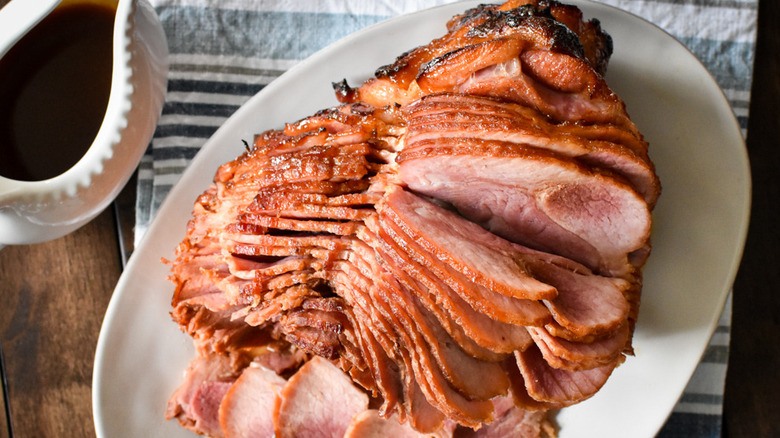
Ingredients
- 8- to 10-pound spiral ham
- ½ cup honey
- 8 tablespoons butter, softened, divided (1 stick)
- 2 tablespoons Dijon mustard
- ¼ cup brown sugar
- ½ teaspoon ground cloves
- ½ teaspoon cinnamon
- ½ teaspoon ground ginger
- 1 teaspoon paprika
- 1 teaspoon garlic powder
Directions
- Preheat the oven to 300 F.
- Line a roasting pan with tin foil.
- Place the ham in the pan with the cut side down. (Note: An 8-pound ham fits in a regular baking dish, but a bigger ham will need a bigger pan. Make sure that the sides are high because the ham will release plenty of juices. A 14-inch cast-iron skillet or a 5-quart braising pan will also work.)
- Combine the honey, 4 tablespoons of butter, and the Dijon mustard in a bowl.
- Spread the mixture over the ham with a spatula, working it in between the spiral slices. Save any remaining mixture.
- If you have a remote probe thermometer, place it in the thickest part of the ham without touching the bone, and set the desired temperature to 120 F.
- Cover the ham loosely with foil.
- If you don't have a thermometer with a remote monitor, roast the ham for 13 minutes per pound, then check the temperature. When it reaches 120 F, move on to the next step.
- Once the ham reaches 120 F, continue roasting it while you make the glaze.
- For the glaze, combine the leftover honey, butter, and mustard mixture with the remaining 4 tablespoons of butter, brown sugar, ground cloves, cinnamon, ground ginger, paprika, and garlic powder in a saucepan.
- Heat the mixture over medium heat until it is smooth and the components have dissolved, then turn off the heat.
- Once the ham reaches 130 F, remove it from the oven.
- Increase the oven temperature to 450 F.
- While the oven is heating, glaze the ham.
- Once the oven reaches 450 F, place the glazed ham back in the oven uncovered and roast it for 5 minutes.
- Then, brush on another coat of glaze and roast the ham for another 5 minutes. The ham needs to reach an internal temperature of 140 F (minimum), and the glaze should be golden and set.
- Let the ham rest at least 15 minutes before serving.
Nutrition
| Calories per Serving | 816 |
| Total Fat | 44.4 g |
| Saturated Fat | 17.8 g |
| Trans Fat | 0.4 g |
| Cholesterol | 257.0 mg |
| Total Carbohydrates | 33.9 g |
| Dietary Fiber | 5.7 g |
| Total Sugars | 17.5 g |
| Sodium | 4,704.1 mg |
| Protein | 68.1 g |
